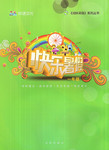题目内容
--How do you usually go to work? –– I usually drive, but if it is fine, I ______ by bike.
A. will go B. would go C. have gone D. had gone
 欣语文化快乐暑假沈阳出版社系列答案
欣语文化快乐暑假沈阳出版社系列答案假如你是北京阳光中学的李涛,今年暑假你打算到纽约自助游,你在沙发网上找到了一位愿意免费为你提供住宿的美国人Peter,请根据下表提供的信息,给Peter 写一封信,介绍你的情况以及你的需求。
注意:1. 词数不少于50;
2. 可适当增加细节,以使行文连贯;
3. 开头和结尾已给出,不计入总词数。
个人信息 | ●姓名:李涛 ●性别:男 ●年龄:17岁 ●能力:可以用英语进行交流 ●爱好:旅游和摄影 |
请求 | ●请求到机场接你 ●在Peter家免费住3天 |
Dear Peter,
_____________________________________________________________________
_____________________________________________________________________
_____________________________________________________________________
_____________________________________________________________________
_____________________________________________________________________
_____________________________________________________________________
Yours,
Li Tao


 y in our imagination or in science fiction (科幻小说).
y in our imagination or in science fiction (科幻小说). sible things can become possible and that’s why most of us like it. But science fiction is not entirely fiction since it is based on science theories (理论). Time travel, for
sible things can become possible and that’s why most of us like it. But science fiction is not entirely fiction since it is based on science theories (理论). Time travel, for